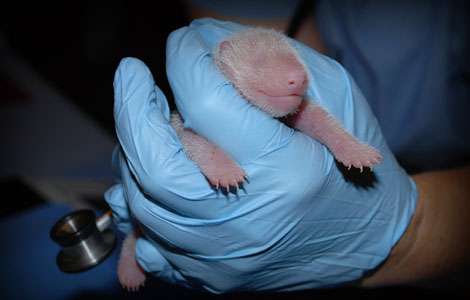Partnership will fight China's water problems
Updated: 2013-08-26 11:02
By Caroline Berg in New York (China Daily)
|
||||||||
One out of three people in the world lives in the East Asia-Pacific region where rapidly growing economies are demanding more water and that is leading to the overexploitation of water resources, water pollution, conflicting water-use allocation and the degradation of ecosystems, according to a report.
In its annual report released last Tuesday, the World Bank Water Partnership Program (WPP) said it implemented activities in 64 countries under phase I (2009-12), and supported 225 activities while disbursing $19.1 million.
During the WPP's first phase of work, the group helped update China's 2002 Water Resources Assistance Strategy to address challenges through new approaches that take into consideration integrated water resources and river-basin management.
Between 2009 and 2012, the WPP funded a case study in China to compare the methodology of national design and planning codes and manuals in the water supply, sewer and storm drainage sectors based on international best practices.
The report concluded that updating design codes could lead to savings of $2.32 billion from investment and $1.52 billion from reduced operational costs in water supply.
In China, four major provinces centered on the eastern seaboard that encompass the heavily populated Beijing, Tianjin, Qingdao and Shanghai cities, are at extreme risk of water shortages, according to the China Water Stress Index from risk analysis company Maplecroft.
Severe water shortage plagues China in general, where 20 percent of the world's population has access to only 7 percent of the world's potable water, according to the UN's Food and Agriculture Organization.
China's people are living longer and eating more, which in turn is driving demand for water-intensive and protein-rich foods such as meat and dairy, according to the UN. Now farmers must produce more soybeans and corn for animal feed, or import.
A portion of the current pressure on water resources comes from increasing demands for animal feed, particularly in meat production, which requires 8 to 10 times more water than cereal production, according to a 2012 World Water Development Report.
One policy outlined by the Chinese State Council has become a major document guiding the country's water resource management. The document states the necessity of implementing a strict water resources control system, and explicitly specifies the main measure to be taken in three Red Lines - control of the development and use of water resources, control of water use efficiency, and restriction of pollutants.
The policy says strict measures to be taken to boost the construction of a water-saving society include implementing the permit system for water withdrawal, practicing reimbursable usage system on water resources, and executing the enhancement of water resources assessments.
Over a second four-year phase, the WPP said it plans to commit more resources to building partnerships that can help increase l a reliable supply of an acceptable quantity and quality of water for health, livelihoods and production, as well as spurs ideas into action, and reinforce sound project design and implementation.
"There is no single practice or policy that will 'solve' all of our water challenges," Heather Cooley, co-director of the Pacific Institute Water Program and lead author of a global water-governance report published in July, said in a press statement. "We need to take critical steps forward toward more efficient and effective structures and policies that promote a sustainable approach to global water governance."
carolineberg@chinadailyusa.com
(China Daily USA 08/26/2013 page2)
Most Viewed
Editor's Picks

|

|

|

|

|

|
Today's Top News
Luxury imports may face fewer big-ticket payoff days
Joint sea drill shows improved relations
UN to probe alleged chemical attack
Bo insists he did not abuse power
Newly born panda cub at Washington zoo doing fine
Market regulators need to fix loopholes
Singapore PM aims to cement relations
Experts call for details on rumor cases
US Weekly

|

|















